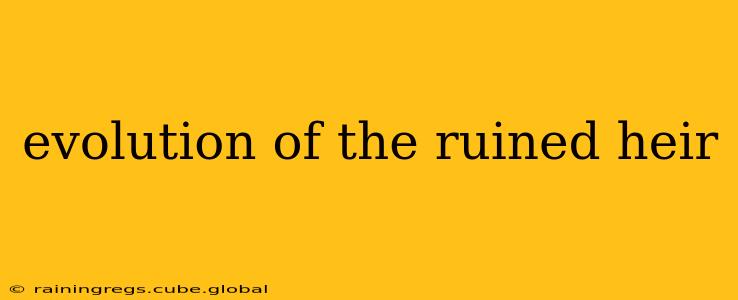The "ruined heir" trope, a staple in fantasy and romance literature, has undergone a fascinating evolution. Initially presented as a tragic figure, burdened by a fallen family and stripped of their birthright, the ruined heir has blossomed into a far more nuanced and complex character archetype. This exploration delves into the evolution of this trope, examining its historical roots, common character traits, and the modern twists that continue to captivate readers.
What is a "Ruined Heir"?
The core of the ruined heir trope lies in the juxtaposition of inherited nobility and present-day destitution. This character, often a prince, princess, or member of a high-ranking aristocratic family, has been stripped of their power, wealth, and social standing due to circumstances beyond their control. This might involve the fall of their kingdom, a family scandal, a political coup, or even a curse. They are often forced to navigate a world drastically different from the privileged life they once knew, often facing prejudice, poverty, and the loss of their identity.
The Classic Tragic Figure: Loss and Despair
Early iterations of the ruined heir trope leaned heavily into tragedy. The character's downfall was often presented as irreversible, their suffering a relentless torment. They were defined by their loss, their noble lineage serving only as a constant reminder of what they had lost. This often resulted in a character consumed by grief, bitterness, or self-destructive behaviors. Think of stories where the once-powerful heir descends into alcoholism, madness, or becomes a bitter recluse, forever haunted by their past.
The Rise of the Resilient Heir: Overcoming Adversity
As the trope evolved, a shift towards resilience became evident. The ruined heir is still faced with significant adversity, but their story focuses less on dwelling on their misfortune and more on their journey of overcoming it. These characters display remarkable strength, resourcefulness, and determination. They may embrace their new reality, finding purpose and meaning outside of their former privileged life. Their nobility is not merely a past title, but a source of inner strength and resilience, shaping their character and guiding their actions.
The Modern Twist: Redefining Nobility
Contemporary iterations of the ruined heir have taken the trope to a new level. The definition of "ruin" itself expands beyond material possessions and social status. We see characters grappling with internal conflicts, questioning inherited values and beliefs. The ruined heir might be fighting against a corrupt system, seeking justice for their family's downfall, or simply striving to create a new life based on personal values rather than societal expectations. The focus shifts from the loss of external privileges to the discovery and cultivation of inner strength and authenticity.
How do they typically reclaim their birthright?
This is highly variable and depends on the specific story. Some might reclaim their birthright through political maneuvering, strategic alliances, or even armed rebellion. Others might find their true power lies not in reclaiming a lost title but in forging a new path, achieving a level of influence and impact that transcends traditional notions of power.
Are ruined heirs always noble?
While traditionally associated with nobility, the trope can be adapted. The character could come from a wealthy but morally corrupt family, and their "ruin" is a consequence of their family's downfall due to their own actions or injustices. This allows for explorations of complex moral themes.
What are the common struggles faced by ruined heirs?
Ruined heirs often face issues like poverty, social ostracism, identity crises, mental health challenges (stemming from their loss and the need to adapt), and the betrayal or abandonment by those they once trusted.
What makes the ruined heir trope so enduringly popular?
The enduring appeal of the ruined heir trope stems from its exploration of universal themes of loss, resilience, identity, and the search for meaning. Readers connect with the character's struggle, finding inspiration in their journey of overcoming adversity and finding their true worth. The trope also offers exciting opportunities for plot development, encompassing elements of political intrigue, adventure, romance, and personal growth.
The evolution of the ruined heir trope showcases the ever-changing landscape of storytelling. While the core concept remains – a character stripped of their privilege – the focus has shifted from highlighting tragedy to celebrating resilience, self-discovery, and the ultimate triumph of the human spirit. The enduring popularity of this archetype proves its capacity for continuous reinvention, providing a timeless framework for exploring complex themes within a captivating narrative.
